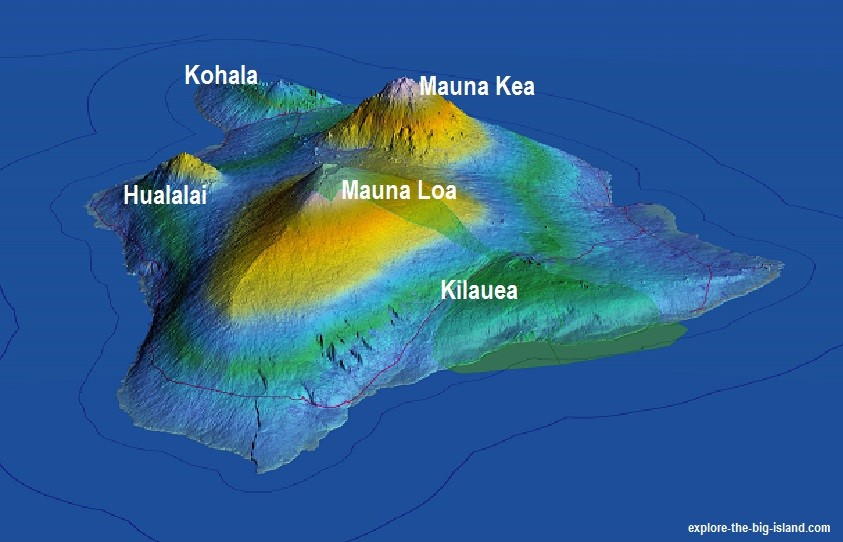- Joined
- Apr 20, 2018
- Messages
- 10,257
- Reaction score
- 4,161
- Location
- Washington, D.C.
- Gender
- Undisclosed
- Political Leaning
- Undisclosed
Hawaii's big island isn't a place I know well; however, given the Kilauea eruption we've witnessed for weeks now, and because I know the whole Hawaiian island chain is the result of a piece of the crust moving over a "hot spot," I wondered how many volcanoes are on that island. Turns out there are several, and Kilauea isn't the only one that's active.

In addition to Kilauea, Mona Loa and Hualalai are also active. The island is about half the size of the DFW Metroplex.
I have to ask, "Why does anyone live around any of the three active volcanoes there?" Yes, I realize that the area around Kilauea is, besides the Kona Coast area between the other four peaks, about the only fairly flat-ish place on which to build. But it's flat land on top of a volcano! Just because it's a flat space doesn't mean it is or ever was a good idea to "put down roots" there.
I'm not ragging on the people who are there. I'm saying that certain places just aren't good places to build.
I'm not saying don't build in those kinds of places. I'm saying that if you choose to live there, it's AYOR don't expect too much sympathy when lots of rain falls, the volcano erupts or the earth moves. No, one doesn't know when those kinds of calamities will happen, but one knows damn well that sooner or later they will happen; thus one is not obligated to put oneself in the way of them. The reality is all one had to do is ask one's realtor for geological info before deciding to buy.

In addition to Kilauea, Mona Loa and Hualalai are also active. The island is about half the size of the DFW Metroplex.
I have to ask, "Why does anyone live around any of the three active volcanoes there?" Yes, I realize that the area around Kilauea is, besides the Kona Coast area between the other four peaks, about the only fairly flat-ish place on which to build. But it's flat land on top of a volcano! Just because it's a flat space doesn't mean it is or ever was a good idea to "put down roots" there.
I'm not ragging on the people who are there. I'm saying that certain places just aren't good places to build.
- Volcano --> That it's a shield or fissure volcano doesn't matter; it's still a volcano! It just doesn't make sense to build a house on it.
- Fault line --> The earth moving under one's feet is best left to amusement parks, sex and songs. Until building homes from rubber is perfected, it's just not a good idea to live where the earth quakes.
- Floodplains --> What is there to say? When it rains enough, rivers flood. You can't stop the rain. Remember New Orleans and Katrina? What part of NoLa was fared okay, all things considered? The Quarter. Why? Because it's above the floodplain. The folks who founded the city had the sense to build on high ground, but the people who came after apparently forgot that high ground is dry ground.
Remember The Great Flood of 1993?

Remember the 2008 Flood?

Assessing the Midwest Floods of 2008 (and 1993)
I'm not saying don't build in those kinds of places. I'm saying that if you choose to live there, it's AYOR don't expect too much sympathy when lots of rain falls, the volcano erupts or the earth moves. No, one doesn't know when those kinds of calamities will happen, but one knows damn well that sooner or later they will happen; thus one is not obligated to put oneself in the way of them. The reality is all one had to do is ask one's realtor for geological info before deciding to buy.
